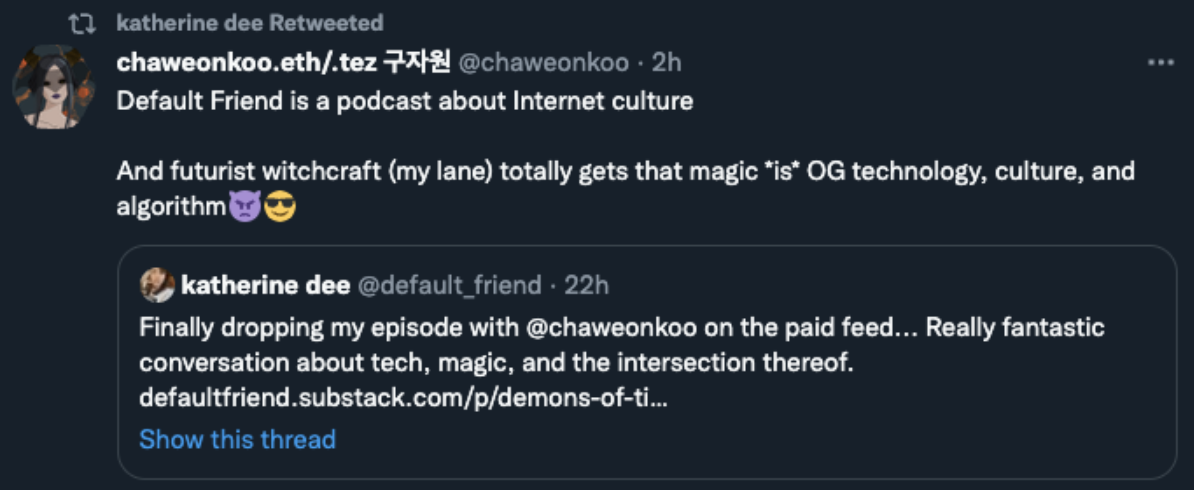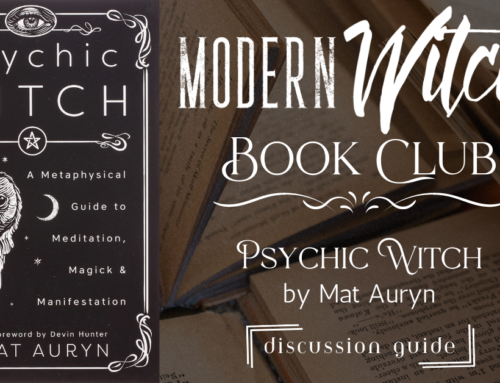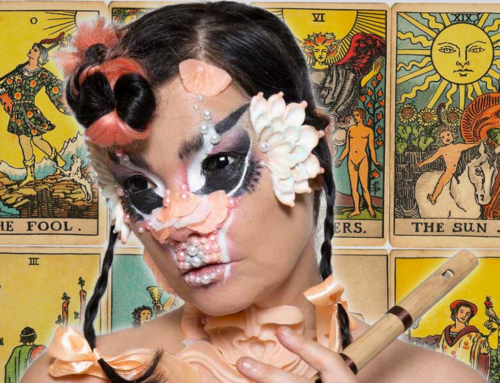Recently, I went on the default_friend podcast to talk about futurist occultism. By the way, default_friend is not about witchcraft or the occult – It’s an Internet culture podcast.

There are no easy esoteric labels for a spiritual bitch like me.
So, I’ve started to call myself: FUTURIST WITCH.
The type of witch who:
- writes a whole book on futurist witchcraft (which tons of beautiful illustrations)
- does rituals on the blockchain
- aspires to create a metaverse experience of Hekate
And, there’s a whole lotta us out there.
Intersections
The past year has been quasi-sabbatical, while I deeply integrate and reconcile the myriad intersections of my identity.
There four distinct circles that overlap:
- Korean-American (East and West)
- Futurist
- Atheist
- Witch/occultist
Korean-Americans are an insular community, revolving around evangelical church. But I’m not about that life. See: atheist.
Futurists are notoriously stereotyped as being the antithesis of spiritual people. I literally have a day job in the web3 world, and yet I have spent four year building a track record of interest in the esoteric. Besides, the occult (like paper) is transformative technology itself.
Atheists find my interest in the occult to be highly sus. Meanwhile, so occultists and just spiritual people in general can’t understand how a witch can also be a godless skeptic. Both sides are stuck in dogma, as far as I’m concerned.
And witches and occultists – I can’t relate to many anymore. Too much fossilization and romanticization and rose-colored glasses about what is old vs. new.
Where Futurists Witch Go
My haunting grounds are not the typical coven.
It’s Decentralized Autonamous Organizations in the metaverse, where we don’t say things like “IRL” (in real life) and instead say “AFK” (away from keyboard).
Because your digital identity feels like an extension of your carbon-based self.
My preferred rituals are decidedly chaos magick inspired, because I simply don’t have a devotional bone in my body.
And yet, for the past four years (timeframe of a bachelor’s degree), I’ve practiced more traditional rituals.
Because I think it’s foolish to re-invent the wheel or to skip foundational skills.
Instead, I believe in the engineering concept of “first principles” – after four years, an MIT undergrad can build a bridge over the Nile…or in Antarctica.
I want to be a witch who can do high-performance rituals in almost any context. Let me reverse engineer what “works” in this human experience (whether in business, culture, religion, anything really)
Witchcraft for the Pragmatist
For me, witchcraft is a performance-based life hack.
I have excel spreadsheets to track success rate rituals.
Would anyone expect a life-long atheist (since age five) to suddenly become devotional and religious to anything? It simply isn’t in my temperament. I am completely indifferent to it.
No, I am concerned with the practicalities of being a human being choosing to live in the Fourth Industrial Revolution, accepting to actively participate in networks of information, surrendering to the ubiquity of the cyborg.
I respect the esoteric arts for being anti-fragile.
Where the Cyborg Witch Shall Go
There is a burgeoning population of young seekers, who have grown up hanging out with friends on Fortnite and Roblox, going to the BlackPink concert on PUBG, exploring their visual identity on Zepeto.
I am excited to connect with them, these digital natives, these metaverse maestros, these passionate, self-aware cyborgs who are living out the follies of youth on a public stage.
Ultimately, I don’t judge them.
How can I, when my own youth went on a similar trajectory as theirs?
Ice hockey legend Wayne Gretzky said: “I skate to where the puck is going, not where it has been.”
Go where the puck is going.
But with magic, you can align yourself to better and more enjoyably get there.
What worthy pursuit it is: this magic, this influence, this self-agency.
So let’s hold hands, arms swinging, eyes soft but steely, as we gaze into the horizon at what is coming towards us.
We will meet it, delighted.





